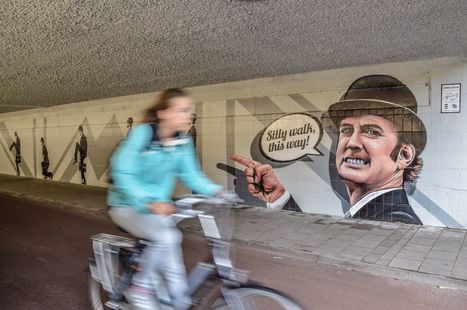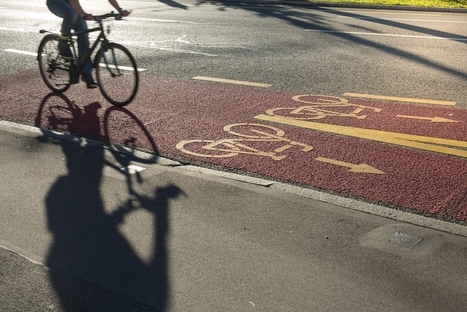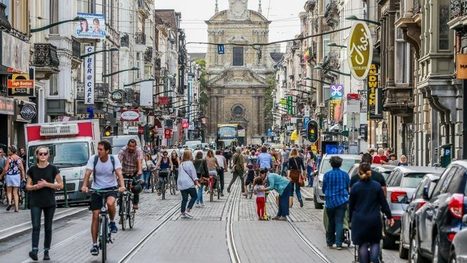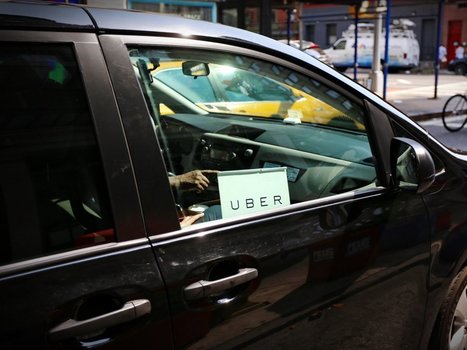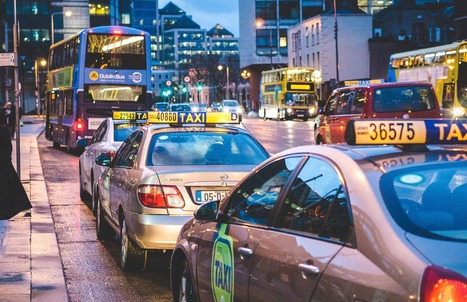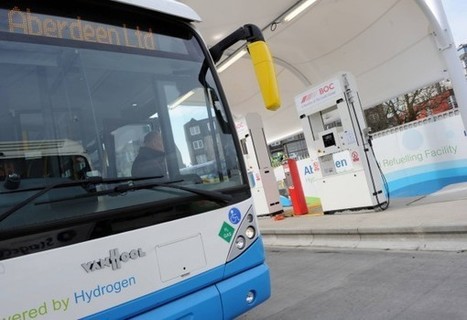 Your new post is loading...

|
Scooped by
Energy Cities
October 31, 2018 6:20 AM
|
Recorded as part of the CIVITAS SUMPs-Up project, this podcast sheds light on the SUMP situation in a series of such locations from across Europe.
Mobility practitioners from Hengelo (the Netherlands), Sligo County (Republic of Ireland), Ghimbav (Romania), Vercelli (Italy)and on Greek islands, discuss the realities they face and give insight into the unique hurdles that they must overcome.

|
Scooped by
Energy Cities
October 23, 2018 10:43 AM
|
This report identifies policy priorities, megatrends and pressing issues regarding the decarbonisation of urban passenger transport. It presents the results of an expert survey on important challenges in the area and summarises the findings of a workshop with 36 experts from 12 countries regarding strategies for the transition to carbon-neutral urban passenger transport.

|
Scooped by
Energy Cities
October 18, 2018 6:38 AM
|
From 1 September, public buses in Dunkirk are completely free of charge making it “the largest metropolitan area in France and Europe to introduce free for all on its entire bus network”, says Patrice Vergriete, Mayor of Dunkirk. And the initiative has already shown great success: bus journeys have increased by 50 % since the launch.

|
Scooped by
Energy Cities
October 16, 2018 7:35 AM
|
Dunkirk is a month into a project that makes it the biggest European city to offer entirely free public transport to residents and visitors alike. So what do people think?

|
Scooped by
Energy Cities
October 15, 2018 5:59 AM
|
There are now 43 million dirty diesels on Europe’s roads, and their numbers continue to grow three years after the Dieselgate scandal was exposed, a new report concludes. Even a diesel car that passed the EU’s new on-road test emits nine times the legal amount of nitrogen oxides (NOx) when driven in a way more representative of typical driving, new testing shows. NGO Transport & Environment (T&E), which authored the report, said it shows combustion engines – including those which passed the official Real-Driving Emissions test – are not clean and will continue to pollute in the foreseeable future.

|
Scooped by
Energy Cities
October 10, 2018 8:01 AM
|
This report examines how new shared mobility services could change mobility in Ireland’s Greater Dublin Area. Simulations of eleven different shared transport scenarios show how such services could affect congestion, CO2 emissions and the use of public space. They also examine how such solutions might impact service quality, the cost of mobility, citizens’ access to opportunities and their use of public transport. The findings provide decision makers with evidence to properly weigh opportunities and challenges created by new forms of shared transport. The work is part of a series of studies on shared mobility in different urban and metropolitan contexts.

|
Scooped by
Energy Cities
October 10, 2018 7:42 AM
|
Through an identificaton of good practice across the UK, the report explores a number of successful mobility strategies, including stakeholder engagement in congestion charges, the use of gamification to encourage sustainable mobility and the inclusion of local companies in mobility management.

|
Scooped by
Energy Cities
September 24, 2018 10:54 AM
|
Izmir, Turkey’s third-largest city with a population of close to 4.2 million, has secured a EUR 80 million loan from the European Bank for Reconstruction and Development (EBRD) for a EUR 250 million project to build its second metro line.
Metro development in Izmir represents a major investment in zero-emission transport at the local level. The project will contribute to sustainable transport through providing an alternative solution to the use of buses, minibuses, taxis, and private vehicles, significantly contributing to the reduction of air pollutants and greenhouse gas (GHG) emissions, according to the EBRD’s website.

|
Scooped by
Energy Cities
August 29, 2018 6:07 AM
|
Petit guide de recommandations à l'usage des décideurs publics et privés
L'objectif de ce guide est d'éclairer les décideurs publics et privés pour qu'ils agissent sur les transports par le biais de politiques locales de développement durable, de planification urbaine ou de responsabilité sociétale et environnementale des entreprises. Il s'adresse aux collectivités territoriales, autorités organisatrices de la mobilité, employeurs et offreurs de service qui ont leur rôle à jouer pour réussir le passage à l'écomobilité, tout en conjuguant performance économique et environnementale.
Ce guide présente les clés pour agir dans les territoires sur les transports de la vie quotidienne en zone urbaine, mais aussi dans les zones rurales et périurbaines. Illustré par de nombreux exemples de coûts, de bonnes pratiques, d'outils disonibles, il aidera les décideurs à faire évoluer les transports vers plus d'inclusion et de soutenabilité tant écologique qu'économique.

|
Scooped by
Energy Cities
August 2, 2018 3:56 AM
|
EUROPEANMOBILITYWEEK 2018 is focusing on ‘multimodality’ - the mixing of transport modes within the same journey or for different trips. Many of us instinctively opt for the same method of transport when moving around without necessarily examining the needs of the specific journey. The car may be the best way to take your family to the seaside, for example, but is it the best way to get them to the city centre where space and access is often limited?

|
Scooped by
Energy Cities
July 19, 2018 4:31 AM
|
Mieux vaut demander pardon que permission ! C’était la stratégie adoptée par Uber à ses débuts. Mais les villes comptent bien remettre de l'ordre dans la mobilité de demain.

|
Scooped by
Energy Cities
July 10, 2018 9:47 AM
|
Only one month after Geneva committed to becoming the first city to join the Urban Air Mobility (UAM) Initiative, the cities of Hamburg, Ghent and Ingolstad have also joined the initiative. UAM aims to develop the market for this new dimension in urban mobility, which could help address unmet mobility user needs and offer new opportunities for European companies.

|
Scooped by
Energy Cities
July 9, 2018 9:36 AM
|
Le panorama de la mobilité durable réalisé pour la première fois par Greenpeace en France examine l’action de 12 grandes villes et agglomérations françaises dans ce domaine : Bordeaux, Grenoble, Lille, Lyon, Marseille, Montpellier, Nantes, Nice, Paris, Rennes, Strasbourg, Toulouse.
Avec l’appui du Réseau Action Climat, nous avons évalué le positionnement de ces villes et agglomérations sur la sortie progressive des véhicules diesel puis essence, qui alimentent les changements climatiques et la pollution de l’air. Nous avons également réuni les points de vue et analyses d’une vingtaine d’associations locales sur l’action et la dynamique impulsées par leurs élus (ville et/ou métropole) en matière de mobilité durable : des associations de promotion ou de défense des usagers des transports en commun (membres de la Fédération Nationale des Associations d’Usagers de Transports) et des associations de promotion du vélo (pour la plupart membres de la Fédération française des Usagers de la Bicyclette).
|

|
Scooped by
Energy Cities
October 24, 2018 12:00 PM
|
Through an identificaton of good practice across the UK, the report explores a number of successful mobility strategies, including stakeholder engagement in congestion charges, the use of gamification to encourage sustainable mobility and the inclusion of local companies in mobility management. The report presents a selection of strategies which support the implementation of SUMPs. Further to good practice examples, the report highlights the importance of developing local knowledge, enhancing stakeholder engagement and employing norms and standardisation.

|
Scooped by
Energy Cities
October 18, 2018 11:24 AM
|
Urban public transport (UPT) plays an essential role in dealing with diseconomies of urban agglomerations, such as traffic congestion, air pollution and noise, and in attaining the objectives of low-carbon, resource-efficient and liveable urban areas. However, transport authorities are confronted with difficulties to ensure the financial sustainability of UPT systems. Fares and other direct revenues from UPT typically do not cover the cost of providing the service, since they must be low enough both to ensure affordable accessibility and to be competitive with private vehicles. This means, in practice, that UPT-specific infrastructure and part of the operation and maintenance (O&M) costs must be covered by public subsidies from different government levels. Less commonly, UPT costs are partially covered by contributions of indirect beneficiaries. Finding an appropriate funding mix for UPT is very often a cumbersome exercise. Continuous urban growth, evolving demand patterns, higher environmental standards and the emergence of breakthrough technologies and services in urban mobility call for significant improvement and expansion of UPT networks. The resulting increase in investment and O&M will most likely generate additional financial gaps to Public Transport Authorities (PTAs) that are already severely compelled by debt and deficit constraints. As a response to this challenge, this pilot study provides an active research on innovative ways to sustainably financing UPT within an evidence-based and contextspecific approach. The aim is to develop recommendations, proposals and guidelines on innovative financial mechanisms for the UPT system at European Union level. The study is not proposing concrete actions because, due to the subsidiarity principle, the European Commission is limited to providing advice and, in some cases, financial support to PTAs through programmes with specific objectives.

|
Scooped by
Energy Cities
October 18, 2018 6:04 AM
|
As the need to reduce carbon emissions from cities becomes ever more clear, London sets itself on a path to ban cars from half the streets in its city center.

|
Scooped by
Energy Cities
October 15, 2018 9:00 AM
|
Lessons from the Dutch, where the number of bikes exceeds the number of people.

|
Scooped by
Energy Cities
October 15, 2018 5:56 AM
|
Denmark announced on Tuesday (2 October) that it will ban the sale of new cars with internal combustion engines by 2030 and hopes to have 1 million electric and hybrid cars on the roads by then.

|
Scooped by
Energy Cities
October 10, 2018 7:44 AM
|
The first SIMP (Sustainable Island Mobility Plan) in Europe will be implemented on the Greek island of Sifnos, followed by Naxos, small Cyclades and Kea. A SIMP is envisaged to be the island equivalent to a Sustainable Urban Mobility Plan (SUMP), with the only difference that it focuses on an island and not on a particular city/urban area. The strategic goal of a SIMP would be the integrated confrontation of the special problems and challenges that an island faces and the provision of sustainable mobility solutions on transport and land-use planning, mobility management, pricing policy and logistics.
The objective is to promote “holidays with less or no car, thus reducing traffic congestion and safety" said Mr. Anagnostopoulos (coordinator of the Network for Sustainable Mobility CIVINET CY-EL)

|
Scooped by
Energy Cities
October 10, 2018 7:35 AM
|
With urban freight deliveries becoming more common due to a rapid increase in e-commerce, cities are looking for new ways to tackle increased congestion and pollution from increased numbers of light commercial vehicles (LCVs). One unusual approach that has been 'delivering' significant results is the micro-logistics approach to urban freight. The City of Frankfurt am Main, UPS, partners IHK Frankfurt am Main and House of Logistics and Mobility (HOLM) GmbH have been experimenting with bicycles in micro-logistics.

|
Scooped by
Energy Cities
September 18, 2018 11:21 AM
|
The mayors of Brussels and Paris have called for an annual car-free day for all of Europe, citing initiatives in their cities that have driven down pollution. But a recent damning report by the EU Court of Auditors revealed there is plenty of work left to do.

|
Scooped by
Energy Cities
August 6, 2018 4:55 AM
|
New York City officials announced a plan to cap the number of ride-sharing cars from companies like Uber and Lyft that can operate in the city. The legislation is motivated by increased traffic congestion and driver suicides.

|
Scooped by
Energy Cities
August 2, 2018 3:50 AM
|
Le premier enseignement, et de taille, est l'impératif pour les villes de devenir en grandeur nature, des villes-plateformes, qui soient capables d'héberger, expérimenter et offrir des nouvelles dispositions, voire imaginer d'autres régulations pour rendre possible une très grande diversité de nouveaux modèles d'usage et les modèles économiques qui en découlent. Les villes, qui furent pionnières avec des services d'une nouvelle génération, telles les voitures en auto partage électrique, ne peuvent plus rester elles-mêmes prisonnières d'un modèle particulier de développement, d'un usage. Elles ont été à la pointe, quand un nouveau monde était en train d'émerger, elles doivent le rester quand un autre monde amène ses propres ruptures. Cette agilité devient un enjeu majeur pour les gouvernances urbaines. Elles seront au cœur de leur capacité à évoluer, pour continuer à épouser une courbe ascendante dans la génération des services, avec une forte acceptabilité sociale.

|
Scooped by
Energy Cities
July 11, 2018 7:49 AM
|
The Irish OASC cities Cork, Dublin, Galway, and Limerick have been working together for the last two years to establish a common ground among the cities’ smart initiatives.
One of the most tangible results of the collaboration is the so-called adaptive smart traffic system that aims at alleviating traffic and at the same time reducing noise and air pollution by use of IoT-enabled smart city technology. This project has been recently awarded with the Smart 50 Award in the category energy and has been established on commonly defined demands in the four cities.
The four cities are forming OASC Ireland, a joint effort that drives the exchange of best practices and collaboration both in terms of technology deployment to solve challenges within the city, but also to improve policy and e-government activities.
Cork, Dublin, Galway, and Limerick have been working collaboratively with a number of public institutions and industry partners on solutions based on Internet of Things (IoT) for cities, from the early planning phase of the project to the analysis of the data collected.
Dr Martin Serrano, IoT Unit Director at Insight and OASC Ireland coordinator, said: “This project has motivated the Irish OASC cities – Cork, Dublin, Galway and Limerick – to join forces for the first time across the cities’ administrative and technical offices. It also raised awareness of how IoT technologies can help solve challenges in the city.”

|
Scooped by
Energy Cities
July 9, 2018 10:52 AM
|
A total of 62 hydrogen-powered buses are to be introduced into the public transportation systems of British cities Aberdeen and Dundee and Germany’s Cologne and Wuppertal. This venture is part of two projects, JIVE and JIVE 2, which have received EUR 57 million in funding from the EU. The projects aim to promote hydrogen fuel cell (FC) buses as a commercially viable means of zero-emission public transportation.
|

 Your new post is loading...
Your new post is loading...








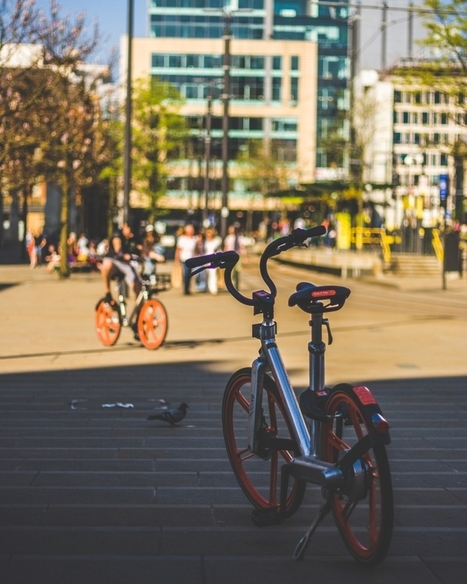

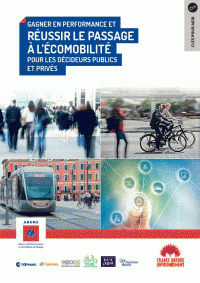
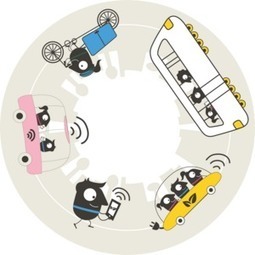

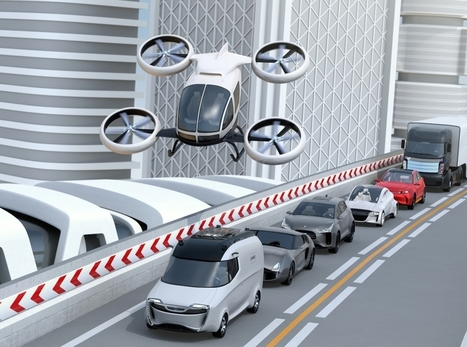
![[RAPPORT] Panorama de la mobilité durable 2018 | Energy Transition in Europe | www.energy-cities.eu | Scoop.it](https://img.scoop.it/5YI94USu-RVqXOkRPdOwFjl72eJkfbmt4t8yenImKBVvK0kTmF0xjctABnaLJIm9)



